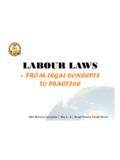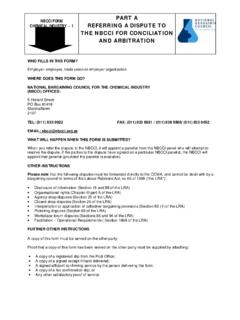Transcription of Your rights at work - Section 27
1 153 your rightsat workCHAPTER Introduction.. Important laws.. Constitution.. Labour Relations Act.. 159 What is the LRA?.. 159 Who does the LRA cover?.. 159 What protections in the LRA are important for employees with HIV or AIDS ?.. 160 Dismissals.. Employment Equity Act.. 161 What is the Employment Equity Act?.. 161 What does the EEA cover?.. 161 What does the EEA say about HIV/AIDS ?.. 161 Unfair discrimination.. 162 HIV testing.. Occupational Health and Safety Act, and Mine Health and Safety Act.. Compensation for Occupational Injuries and Diseases Act.. Basic Conditions of Employment Act.. Medical Schemes Act.. Common employment questions.
2 An employer force a job applicant to have an HIV test? .. you have the right to confidentiality at work ?.. an employer demand to know if the cause of an illness is HIV infection?.. an employer refuse to employ you because you have HIV?.. an employer dismiss you when you have HIV but are still healthy?.. it legal to dismiss a person who has AIDS?.. 170 Illness and incapacity.. 170 Reasonable accommodation.. if other employees refuse to work with a person who has HIV or AIDS?.. companies develop a workplace HIV/AIDS policy and programme?.. 172 Developing an HIV/AIDS policy: 8 key stages.. your employer refuse to give you employee benefits because you have HIV?
3 Standing up for rights at work .. Summary of rights of employees living with HIV or AIDS.. 177 Talking points.. 178 References and resource materials .. 179156 IntroductionEmployees can experience HIV-related discrimination from employers ,supervisors or other employees. This chapter looks at: The laws protecting people living with HIV or AIDS in the workplace. Common questions around HIV/AIDS and employment issues. How to stand up for your rights at work . Labour Court or other statutory bodiesthat arbitrate(makedecisions) on employment disputes will look at: The Constitution, which is based upon the principle of equalityfor everyone in South Africa.
4 Labour laws and case law built up in the Labour Courts, the Commission for Conciliation, Mediation and Arbitration (CCMA)and the old Industrial Courts, which follow the principles of non-discrimination, fair labour practices and the reasonable rights andduties of employers and employees. The latest scientific and medical knowledge about HIV/AIDS, especially that: HIV cannot be transmitted by casual contact between people at work . People with HIV are usually as healthy and productive as employees who are not THE CONSTITUTIONThe Constitution gives all people the right to equality and non-discrimination. It also gives employees the right to be treated fairly at work .
5 The Bill of Rightssays: Everyone has the right to fair labour means that in the privateand public sectoryour employercannot unfairly discriminateagainst you for example, this meansthey can t treat you unfairly just because you re a woman, or justbecause you have a TESTING IS UNFAIRDISCRIMINATIONIn Hoffman v South African Airways(2000), theConstitutional Court was asked to decide if SAA hadviolatedHoffman s constitutional right to equality,dignity and fair labour practices. Hoffman applied for a job with SAA as a cabinattendant. He was asked to go for an HIV test, andwas refused the job because he was HIV positive. The Court decided: SAA had discriminated against Hoffman.
6 The discrimination was unfair, based on the medical denial of employment to the appellantbecause he was living with HIV impaired his dignityand constituted unfair discrimination. Being HIV negative was not an inherent requirement of the job of being a cabin attendant (essential todo the job). The Constitution also places a duty on the courts to use internationallawas a guide when interpreting constitutional rights . The courts needto take note of the international agreements and declarations on HIVand AIDS, such as: The 1988 ILO Consensus Statement on HIV/AIDS. The SADC Code on HIV/AIDS and Employment (1997). Workers with HIV infection who are healthy should be treated the same as any other worker.
7 Workers with HIV-related illnesses, including AIDS, should be treated thesame as any other worker with an Health Organisation/ILO Consensus Statement on AIDS in the WorkplaceFor more on the Bill ofRights, including theEquality Clause, seeChapter 4 on page 63. To find the ILO and SADC agreements, seeReferences and resourcematerials on page more on international law, seeChapter 5 on page THE LABOUR RELATIONS ACTWhat is the LRA?In 1995, a new Labour Relations Act (LRA)was passed by law regulatesrelations between employers and workers. It governsissues such as the right to join trade unions and employer organisations,and the right to strike and lock out.
8 The LRA allows employers and employees to decide on rules andregulations for their industry or industrial sector through collectiveagreements, but it also refers to fundamental rightsthat are the samefor all does the LRA cover?The LRA covers all employees and employers , and treats every one thesame. This means that domestic workers now have the same rights asfactory workers, and people working for government have the samerights as people working in the private sector. The only employees who are not covered by the LRA are peopleworking for the South African National Defence Force (SANDF), theNational Intelligence Agency (NIA) and Secret Services.
9 But even theseemployees are protected by the Constitution and therefore have theright to fair labour practices and MEMBERS ARE WORKERSIn South African National Defence Force Union vMinister of Defence(1999), the Constitutional Courtwas asked to look at sections of the Defence Actwhich prohibited SANDF members from joining tradeunions. The Court decided: Certain sections of the Act were unconstitutional. SANDF members have a constitutional right to join trade unions. The case is important because the court held thatSANDF members are also regarded as workers, andare protected by the constitutional right to fair protections in the LRA are important for employees with HIV or AIDS ?
10 The LRA protects employees from: Unfair labour practices(eg a worker is taken off certain work because she has HIV). Unfair dismissals(eg a worker is dismissed because he has HIV).DismissalsThe reason for a dismissal must be fair and proper procedures mustbe followed. There is a Code of Good Practice: Dismissalattached tothe LRA, which provides practical information on what is a fair reasonfor a dismissal and what procedures should be followed. REASONS FOR DISMISSAL ALLOWED BY THE LRA1. Dismissals for misconduct (bad behaviour)2. Dismissals for incapacity(including inability to do a job due to ill-health) 3. Dismissals for operational requirements (eg retrenchment).










